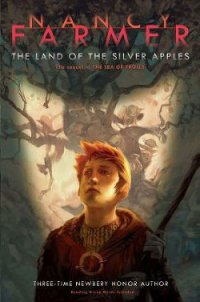Tehanu The Last Book of Earthsea - Le Guin Ursula Kroeber (читать бесплатно книги без сокращений TXT) 📗
“I did tell you you ought to keep the house locked.”
“No-Maybe-That’s just it. ‘ ‘
“I know,’ ‘ said Lark.
“But I meant, when they were here-I could have run out and fetched Shandy and Clearbrook-maybe I could have taken Therru, Or I could have gone to the lean-to and got the pitchfork myself. Or the apple-pruner. It’s seven feet long with a blade like a razor; I keep it the way Flint kept it. Why didn’t I do that? Why didn’t I do something? Why did I just lock myself in-when it wasn’t any good trying to? If he- If Hawk hadn’t been here- All I did was trap myself and Therru. I did finally go to the door with the butcher knife, and I shouted at them. I was half crazy. But that wouldn’t have scared them off.”
“I don’t know,” Lark said. “It was crazy, but maybe . . . I don’t know. What could you do but lock the doors? But it’s like we’re all our lives locking the doors. It’s the house we live in.”
They looked around at the stone walls, the stone floors, the stone chimney, the sunny window of the kitchen of Oak Farm, Farmer Flint’s house.
“That girl, that woman they murdered,” Lark said, looking shrewdly at Tenar. “She was the same one." Tenar nodded.
“One of them told me she was pregnant. Four, five months along.”
They were both silent.
“Trapped,” Tenar said.
Lark sat back, her hands on the skirt on her heavy thighs, her back straight, her handsome face set. “Fear,” she said. “What are we so afraid of? Why do we let ‘em tell us we’re afraid? What is it they’re afraid of? ‘ ‘ She picked up the stocking she had been darning, turned it in her hands, was silent awhile; finally she said, “What are they afraid of us for?”
Tenar spun and did not answer.
Therru came running in, and Lark greeted her: “There’s my honey! Come give me a hug, my honey girl!”
Therru hugged her hastily. “Who are the men they caught?” she demanded in her hoarse, toneless voice, looking from Lark to Tenar.
Tenar stopped her wheel. She spoke slowly.
“One was Handy. One was a man called Shag. The one that was hurt is called Hake.” She kept her eyes on Therru’s face; she saw the fire, the scar reddening. “The woman they killed was called Senny, I think.”
“Senini,’ ‘ the child whispered.
Tenar nodded.
“Did they kil lher dead?”
She nodded again.
“Tadpole says they were here.”
She nodded again.
The child looked around the room, as the women had done; but her look was utterly unacceptant, seeing no walls.
“Will you kill them?”
“They may be hanged.”
“Dead?”
“Yes.”
Therru nodded, half indifferently. She went out again, rejoining Lark’s children by the wellhouse.
The two women said nothing. They spun and mended, silent, by the fire, in Flint’s house.
After a long time Lark said, “What’s become of the fellow, the shepherd, that followed ‘em here? Hawk, you said he’s called?”
“He’s asleep in there,’ ‘ said Tenar, nodding to the back of the house.
“Ah,” said Lark.
The wheel purred. “I knew him before last night.”
“Ah. Up at Re Albi, did you?”
Tenar nodded. The wheel purred.
“To follow those three, and take ‘em on in the dark with a pitchfork, that took a bit of courage, now. Not a young man, is he?”
“No.” After a while she went on, “He’d been ill, and needed work. So I sent him over the mountain to tell Clear-brook to take him on here. But Clearbrook thinks he can still do it all himself, so he sent him up above the Springs for the summer herding. He was coming back from that.”
“Think you’ll keep him on here, then?" ‘“If he likes,” said Tenar.
Another group came out to Oak Farm from the village, wanting to hear Goha’s story and tell her their part in the great capture of the murderers, and look at the pitchfork and compare its four long tines to the three bloody spots on the bandages of the man called Hake, and talk it all over again. Tenar was glad to see the evening come, and call Therru in, and shut the door.
She raised her hand to latch it. She lowered her hand and forced herself to turn from it, leaving it unlocked.
“Sparrowhawk’s in your room,” Therru informed her, coming back to the kitchen with eggs from the cool-room.
“I meant to tell you he was here-I’m sorry.
“I know him,” Therru said, washing her face and hands in the pantry. And when Ged came in, heavy-eyed and unkempt, she went straight to him and put up her arms.
“Therru,” he said, and took her up and held her. She clung to him briefly, then broke free.
“I know the beginning part of the Creation," she told him. “Will you sing it to me?” Again glancing at Tenar for permission, he sat down in his place at the hearth.
“I can only say it.”
He nodded and waited, his face rather stern. The child said:
The making from the unmaking,
The ending from the beginning,
Who shall know surely?
What we know is the doorway between them
that we enter departing.
Among all beings ever returning,
the eldest, the Doorkeeper, Segoy.. . .
The child’s voice was like a metal brush drawn across metal, like dry leaves, like the hiss of fire burning. She spoke to the end of the first stanza:
Then from the foam bright E`a broke.
Ged nodded brief, firm approval. “Good,” he said.
“Last night, ” Tenar said. “Last night she learned it. It seems a year ago."
“I can learn more,” said Therru.
“You will," Ged told her.
“Now finish cleaning the squash, please,” said Tenar, and the child obeyed.
“What shall I do?" ‘ Ged asked. Tenar paused, looking at him.
“I need that kettle filled and heated.”
He nodded, and took the kettle to the pump. They made and ate their supper and cleared it away. “Say the Making again as far as you know it,” Ged said to Therru, at the hearth, “and we’ll go on from there.”
She said the second stanza once with him, once with Tenar, once by herself.
“Bed,” said Tenar.
“You didn’t tell Sparrowhawk about the king.”
“You tell him," ‘ Tenar said, amused at this pretext for delay.
Therru turned to Ged. Her face, scarred and whole, seeing and blind, was intent, fiery. “The king came in a ship. He had a sword. He gave me the bone dolphin. His ship was flying, but I was sick, because Handy touched me. But the king touched me there and the mark went away. She showed her round, thin arm. Tenar stared. She had forgotten the mark.
“Some day I want to fly to where he lives,” Therru told Ged. He nodded. “I will do that,’ ‘ she said. “Do you know him?”
“Yes. I know him. I went on a long journey with him.”
“Where?”
“To where the sun doesn’t rise and the stars don’t set. And back from that place.”
“Did you fly?”
He shook his head. “I can only walk,” he said.
The child pondered, and then as if satisfied said, “Good night,” and went off to her room. Tenar followed her; but Therru did not want to be sung to sleep. “I can say the Making in the dark,” she said. “Both stanzas.”
Tenar came back to the kitchen and sat down again across the hearth from Ged.
“How she’s changing!” she said. “I can’t keep up with her. I’m old to be bringing up a child. And she . . . She obeys me, but only because she wants to.”
“It’s the only justification for obedience,” Ged observed. “But when she does take it into her head to disobey me, what can I do? There’s a wildness in her. Sometimes she’s my Therru, sometimes she’s something else, out of reach. I asked Ivy if she’d think of training her. Beech suggested it. Ivy said no. ‘Why not?’ I said. ‘I’m afraid of her!’ she said. . . . But you’re not afraid of her. Nor she of you. You and Lebannen are the only men she’s let touch her. I let that-that Handy-I can’t talk about it. Oh, I’m tired! I don’t understand anything




